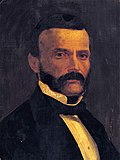| ||||||||||||||
Presidential election | ||||||||||||||
| ||||||||||||||
| ||||||||||||||
 |
|---|
General elections were held in Mexico in September 1857. [1] They were the first to be held under the February 1857 constitution, which introduced direct elections for the presidency, [2] abolished the Senate, and introduced universal male suffrage for citizens aged 18 (if married) or 20 (if single), as long as they had an "honest mode of living". [3]
Contents
Incumbent president Ignacio Comonfort was re-elected with 93% of the vote, defeating Miguel Lerdo de Tejada.

